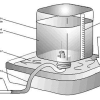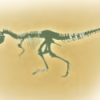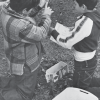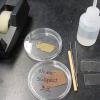Search Results
Showing results 441 to 460 of 792

Caring Together: Activity Stations
Source Institutions
In this Bob the Builder(TM)-themed activity, learners explore the 3Rs (Reduce, Reuse, Recycle) by rotating through several activity stations.

What is Blood Pressure?
Source Institutions
In this activity about heart health (on page 34 of the PDF), learners measure their own blood pressure using an electronic blood pressure monitor with a self-inflating cuff (included in cost of materi

Sharks: Taking a Bite Out of The Myth
Source Institutions
In this activity, learners will explore trends in shark populations using shark landing data from the National Marine Fisheries Service.

Moving On Up: Capillary Action 1
Source Institutions
Over the course of several days, learners explore the property of water that helps plants move water from roots to leaves or gives paper towels the capacity to soak up water.

Statistics: Creature Features
Source Institutions
In this math activity, learners collect, organize, and analyze a set of data related to types of animals in the temperate forest.

Catch Your Breath: Build a Spirometer and Measure your Lung Capacity
Source Institutions
In this activity, learners will measure their lung capacity by making their own spirometer. Learners will then explore factors that affect the amount of air the lungs can hold.

Special Effects: Titanic and Beyond
Source Institutions
In this activity, learners investigate how geometry plays a role in perspective.

Digging Deeper!
Source Institutions
In this activity, learners explore dinosaur skeletons and anatomy. Learners make observations about a T. rex skeleton diagram and then measure the skeleton length and width.

The Wander of Pollen
Source Institutions
In this activity/demonstration, learners explore pollen and how insects and animals transport pollen. Learners investigate and compare wind and animal pollination.

Moving and Working in Space
Source Institutions
In this activity, groups of four learners must complete a set of four manual tasks. The restrictions are that they must complete the tasks in a limited time while wearing garden or rubber gloves.

Litter Critters
Source Institutions
In this outdoor activity, learners use a "litter-critter" wheel to help them identify different animals they find living in a natural litter habitat.

2-Liter Landfill
Source Institutions
In this activity, learners gain a better understanding of how household/school waste breaks down in a landfill. Learners collect trash and then create miniature landfills in 2-liter bottles.

Zoo Calendar
Source Institutions
Use the Zoo Calendar (page 1 of PDF) to involve learners in interdisciplinary, whole language, and writing activities about ecological concepts.

Human Traits
Source Institutions
In this activity, learners investigate variations in human traits. This allows learners' natural curiosity about their identity to draw them into the study of heredity.

Seeing the World Through a Different Lens
Source Institutions
Learners participate in a variety of activities modeling different disabilities.

Bird Binoculars
Source Institutions
This is a tape and glue activity in which learners make binoculars that they can decorate and then use to go bird watching.

Oil Spill Solutions
Source Institutions
In this activity, learners explore how environmental engineers might approach solving the problem of an oil spill.

Slide Whistle
Source Institutions
In this activity, learners build a slide whistle using PVC pipe, bamboo skewer, and piece of foam. Construction of the instrument is relatively simple.
Composting: A Scientific Investigation
Source Institutions
In this activity, learners conduct a scientific investigation involving decomposition and discover that the life cycle of trash is affected by its organic or inorganic nature.

Crime Scene Investigation (CSI) with Powdery Mildew Fungi
Source Institutions
This exercise can be used to stimulate the investigative nature of learners as they use forensic plant pathology techniques to prove the learners' innocence in a mock murder investigation.
